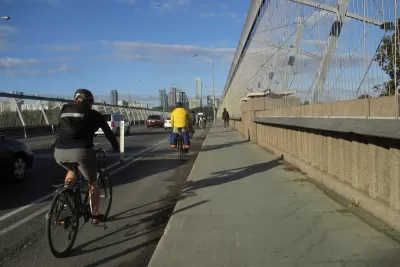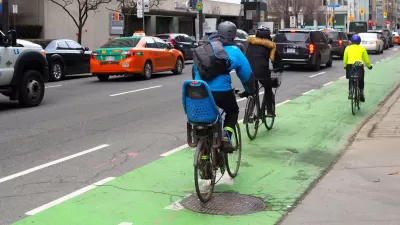Business owners are usually skeptical when planners start talking about removing parking to make space for bike lanes, but study after study has shown bike lanes are good for business. The latest example from Toronto is now exception.

Eric Jaffe shares news of a new study that analyzes data from the city of Toronto to produce findings that are in keeping with previous studies: bike lanes are good for business.
A group of researchers from the University of Toronto and the Center for Active Transportation conducted surveys of merchants and visitors before and after the installation of a bile lane along a 1.5-mile stretch of Bloor Street that raised local concerns when first proposed.
After requesting information about spending, customer counts, visit frequency, and vacancies, the survey's findings present "good news across the board," according to Jaffe. Monthly spending rose, the number of customers rose, the frequency of visits rose, and vacancies held steady.
After detailing the findings and also providing a few caveats, Jaffe notes the unanswered questions about the effect of bike infrastructure on business:
Just why bike lanes have a neutral-to-positive impact on spending remains an open question. The strongest theory — one supported by the Bloor study — is that while cyclists lacking a car trunk might not make large purchases, they make more total purchases over a given period, since an area is now easier and safer for them to visit.
FULL STORY: The latest evidence that bike lanes are good for business

Maui's Vacation Rental Debate Turns Ugly
Verbal attacks, misinformation campaigns and fistfights plague a high-stakes debate to convert thousands of vacation rentals into long-term housing.

Planetizen Federal Action Tracker
A weekly monitor of how Trump’s orders and actions are impacting planners and planning in America.

Chicago’s Ghost Rails
Just beneath the surface of the modern city lie the remnants of its expansive early 20th-century streetcar system.

Bend, Oregon Zoning Reforms Prioritize Small-Scale Housing
The city altered its zoning code to allow multi-family housing and eliminated parking mandates citywide.

Amtrak Cutting Jobs, Funding to High-Speed Rail
The agency plans to cut 10 percent of its workforce and has confirmed it will not fund new high-speed rail projects.

LA Denies Basic Services to Unhoused Residents
The city has repeatedly failed to respond to requests for trash pickup at encampment sites, and eliminated a program that provided mobile showers and toilets.
Urban Design for Planners 1: Software Tools
This six-course series explores essential urban design concepts using open source software and equips planners with the tools they need to participate fully in the urban design process.
Planning for Universal Design
Learn the tools for implementing Universal Design in planning regulations.
planning NEXT
Appalachian Highlands Housing Partners
Mpact (founded as Rail~Volution)
City of Camden Redevelopment Agency
City of Astoria
City of Portland
City of Laramie





























